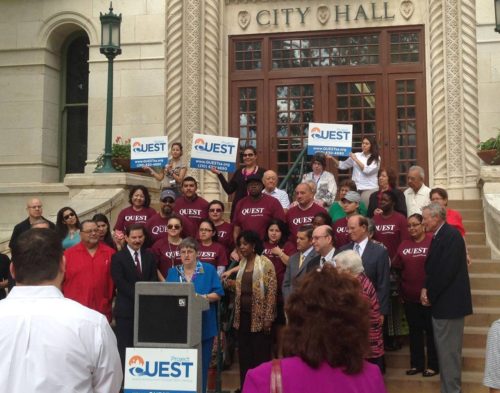Community Crisis Leads to Project QUEST
Written by Carol Baas Sowa, Today’s Catholic Newspaper
The following was republished with permission of Today’s Catholic Newspaper.
 When the Levi Strauss jeans manufacturing plant in San Antonio closed in 1990, it was the culmination of several local plant closings and the effect was devastating. “Two thousand people on the southside of San Antonio lost their jobs,” relates Sister Pearl Ceasar, CDP Superior General of the Congregation of Divine Providence. In those days, she was lead organizer for the Metro Alliance.
When the Levi Strauss jeans manufacturing plant in San Antonio closed in 1990, it was the culmination of several local plant closings and the effect was devastating. “Two thousand people on the southside of San Antonio lost their jobs,” relates Sister Pearl Ceasar, CDP Superior General of the Congregation of Divine Providence. In those days, she was lead organizer for the Metro Alliance.
There had been a change in the economy throughout the United States during the 1980s, she explains, with the vanishing of middle-class wage. People could move into such jobs straight from high school graduation.
Since most of those losing jobs were from South Side churches whose pastors belonged to Communities Organized for Public Service (COPS), it was only natural that they turned to these priests for help. Sister Pearl remembers Father Al Jost, OFM, of St. Leonard Parish telling of waking up to the news of the plant closing and a parishioner’s voice asking, “What are we going to do?”
Groundwork had already been laid in this regard, Sister Pearl notes, with seminars held by the Industrial Areas Foundation (IAF) in the late 1980s and early 90s on the changing economy, under the leadership of Ernesto Cortes Jr. in the Southwest Region. COPS, a church-based, grass roots organization of San Antonio’s West Side and South Side parish communities, had come about through the IAF in 1974. In the early 1980s, two other IAF-affiliated organizations, the Metropolitan Congregation Alliance (MCA), from the south central and northwest areas of town, and the East Side Alliance (ESA) would merge to form the Metro Alliance, which in turn partnered with COPS in 1989.
COPS organizer Tom Holler was initially brought in to oversee what would be 500 house meetings of around 5,000 individuals organized in parishes to address the sudden job loss. These small groups focused specifically on discussing individual work experiences and what was needed to retrain people for new jobs.
It was evident the type of jobs previously held were disappearing and that the jobs needing applicants were higher-skilled positions, primarily in healthcare, which required special training. However, the only training programs available were for lower skill jobs paying far less than what the Levi Strauss employees had been making. Attending community college for higher skill training was not a solution either, since these older workers lacked the resources to complete such studies while supporting their families.
“What needs to happen?” was the question put forth and the response, heard again and again in the small group discussions, was a training program model that guarantee there would be a job at the end of the training – and one with a wage that could support a family. “They needed to know that it wasn’t going to be ‘just any job is a good job,’” says Sister Pearl, which was what the government programs were telling enrollees. They also needed jobs which would pay benefits and offer a career path, with “wrap around” counseling services that would teach these older learners how to sharpen their study skills and offer support as obstacles arose.
Specialists from the University of Texas’s Lyndon B. Johnson School of Public Affairs were then brought in to meet for six weeks with a committee of 40 from COPS/Metro to work out what the program model would look like and committee members were not shy about stating when something was not going to work in San Antonio’s case, causing the “experts” to go back and try again.
“That is why QUEST (Quality Employment through Skills Training) came to be the way it is and why it is successful and has outlived similar projects throughout the United States,” says Sister Pearl. Rather than being based on a theoretical model, it was based on “lived experience.” Contributing to its success has been the enduring and sustaining funding support, from the city level up to the federal government.
Recruiting applicants was initially done through the parishes, she relates, and expanded into community colleges and different training institutes. Those in the program received a stipend while undertaking the 18 months to two years of training. “There was a lot of excitement about the project,” she adds, “because people had a place to go if they needed job training for higher skill, higher wage jobs and it gave people a lot of hope for that.” The success rate has been phenomenal.
Holler stepped aside early on and was followed by Sister Pearl as lead organizer for both COPS and Metro Alliance, she notes, with QUEST being officially incorporated in 1992 under its first executive director, Jack Salvadore. In 2012, Sister Pearl would return to serve as executive director for six years.
It all goes back to COPS, she muses, and what the laid of workers did. “They could have been fired from their jobs and done nothing, but they didn’t,” she says. “They got fired from the job and the first thing they did was go to the parish priest.” And the parish priest turned to COPS.
Contact Project QUEST at (210) 630-4690, info@questsa.org or through QuestSA.org or their Facebook.
In Part 2: facts on Project QUEST’s extraordinary success.

